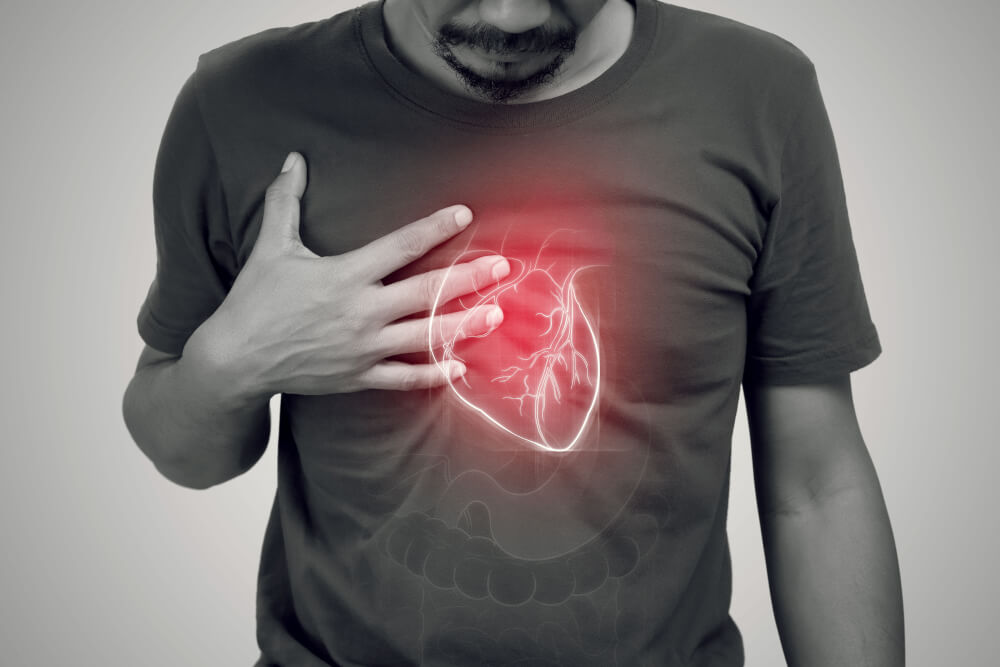Heart Failure: Symptoms, Causes, & Types
Written By: Dr Brajesh Mittal
Updated On:May 15, 2024

What is Heart Failure?
When the heart's pumping capacity is compromised, it results in heart or cardiac failure. Symptoms of heart failure include shortness of breath or swelling in the feet and legs, which is due to fluid accumulation.
The heart might become stiff or too weak to effectively fill with blood and pump it. This can happen over time with certain heart disorders. Heart artery narrowing and elevated blood pressure are two examples of these disorders.
Getting the right care can help people with heart failure live longer and reduce the symptoms of heart failure. Quality of life can be increased by seeking medical treatment.
Heart failure can be a life-threatening condition. In patients with severe heart failure, a heart transplant or a machine to assist the heart in pumping blood may be necessary.
Types of Heart Failure
The following are the different types of heart failure:
-
Right-sided heart failure: This type affects the right ventricle, the lower right chamber of the heart. Swelling could result from fluid backing up into the legs, foot, and tummy.
-
Left-sided heart failure: This type affects the left ventricle, which is the lower left chamber of the heart. Breathing difficulties could result from fluid building up in the lungs.
-
Systolic heart failure: This is a type of left-sided cardiac failure exists. The left ventricle is unable to contract as forcefully as it should. Insufficient blood is being pumped to the body by the weak heart.
-
Diastolic heart failure: This is a type of left-sided heart failure. The left ventricle becomes stiff and has trouble filling with blood.
Causes of Heart Failure
A heart that is weaker, injured, or stiff can develop heart failure.
The heart chambers may extend and enlarge if the heart is weak or injured. The amount of blood required by the body cannot be pumped out by the heart. The ventricles, the heart's primary pumping chambers, cannot fill with enough blood between beats if they are stiff. Certain illnesses, excessive alcohol use, illegal drug usage, and some chemotherapy drugs can all harm the heart muscle. Your genes may also be important.
Heart failure can also be brought on by any of the following disorders that weaken or harm the heart:
-
Coronary artery disease. Heart failure is most frequently brought on by coronary artery disease. Fatty deposits accumulating in the arteries cause the condition. The arteries are clogged with deposits. This lowers blood flow and increases the risk of heart attack.
-
Elevated blood pressure. This disorder, also known as hypertension, makes the heart work harder than it should to pump blood throughout the body. The additional strain over time may cause the heart muscle to become too stiff or frail to effectively pump blood.
-
Concerns with heart valves. The heart's valves maintain proper blood flow. A malfunctioning valve makes it more difficult for the heart to pump blood. Over time, this might weaken the heart. Heart failure may be reversed by treating some heart valve issues.
-
Myocarditis is another name for inflammation of the heart muscle. Myocarditis, which can result in left-sided heart failure, may be caused by viruses or inflammatory conditions.
-
A birth condition of the heart is commonly known as a congenital heart defect. The other components of the heart must exert more effort to pump blood if the heart's chambers or valves haven't developed properly. Heart failure could result from this.
-
Arrhythmias are irregular heartbeats. The heart may beat too quickly due to irregular cardiac rhythms, putting the organ under additional strain. Heart failure can also result from a slow heartbeat. Some people's heart failure may be reversed by treating an irregular heartbeat.
-
Various illnesses. Chronic heart failure may be exacerbated by some chronic illnesses. Diabetes, HIV infection, an overactive or underactive thyroid, or protein or iron accumulation.
Symptoms of Heart Failure
The amount of blood your heart can pump to support your body's needs is insufficient if you have heart failure. A gradual onset of symptoms is possible. However, heart failure signs might occasionally appear out of nowhere. Symptoms of heart failure could be:
-
Breathlessness may occur when resting
-
Drowsiness and weakness
-
Leg, ankle, and foot swelling
-
Unsteady or rapid heartbeat
-
A diminished capacity for exercise
-
Wheezing
-
Coughing up blood-spotted white or pink mucus or coughing up a persistent cough
-
A belly-area swelling
-
Fast fluid buildup-induced weight gain
-
An appetite deficit and nausea
-
Either a decline in attentiveness or difficulty focusing
-
Chest pain if caused by heart attack
When to see a doctor for Heart Failure?
If you believe you may be experiencing heart failure symptoms, consult your healthcare professional. If you experience any of the following, seek immediate medical attention:
-
Ache in the chest
-
Weakness or fainting
-
Shortness of breath, chest pain, or fainting along with an erratic or rapid heartbeat
-
Sudden, intense breathlessness accompanied by white or pink, foamy mucus coughing
Heart failure may be the cause of these symptoms. There are a lot of additional reasons, though. When you visit the emergency room, medical professionals do tests to determine whether your symptoms are caused by heart failure or something else.
Heart Failure Risk Factors
Factors that increase your risk of heart failure include coronary artery disease, heart attacks, heart valve disease, high blood pressure, irregular heartbeats, congenital heart disease, diabetes, sleep apnea, obesity, viral infections, certain types of medication, aging, alcohol use, and smoking or using tobacco.
Heart Failure Complications
Even if your symptoms get better, it's crucial to get regular checks if you have health problems. To check for issues, your healthcare professional can evaluate you and perform tests.
Your age, general health, and the severity of your heart disease all affect the complications of heart failure. They may consist of:
-
Kidney failure or damage
-
Further cardiac problems
-
Liver damage
-
Cardiopulmonary arrest
Stages of Heart Failure
Your doctor should be able to inform you of the stage of heart failure at the time of diagnosis. The stage indicates the extent of your heart failure.
Classifications are typically given from 1 to 4, with 1 denoting the least severe and 4 the most severe:
-
Class 1: No symptoms during regular physical activity
-
Class 2: No symptoms while at rest, but symptoms appear with regular physical activity
-
Class 3: You feel fine at rest, but light exercise brings on symptoms.
-
Class 4 - you experience symptoms even when at rest and are unable to engage in any physical activity without pain.
Your doctors will be better able to choose the treatments they believe will work for you if they are aware of the stage of your heart failure.
Heart Failure Treatment
Heart failure is a chronic, incurable illness that affects many. Treatment, however, can help keep the symptoms under control and is usually ongoing
The primary treatments for heart failure include the following:
-
medicine
-
devices implanted in your chest to manage your heart rhythm
-
surgery
-
lifestyle modifications
A mix of treatments is often recommended.
Heart Failure Prevention
Treating and managing the problems that can lead to heart failure is one method to stop it from happening. These ailments include diabetes, obesity, high blood pressure, and coronary artery disease.
The same lifestyle modifications that are used to treat heart failure may also help prevent it. Try these heart-healthy suggestions:
-
Avoid smoking
-
Take a lot of walks
-
Eat nutritious foods
-
keep a healthy weight
-
Reduce and control your stress
-
Medication as prescribed
References
Baker, D. W. (2002). Prevention of heart failure. Journal of cardiac failure, 8(5), 333-346.
Cohn, J. N. (1996). The management of chronic heart failure. New England Journal of Medicine, 335(7), 490-498.
Ekman, I., Cleland, J. G., Andersson, B., & Swedberg, K. (2005). Exploring symptoms in chronic heart failure. European Journal of Heart Failure, 7(5), 699-703.
Groenewegen, A., Rutten, F. H., Mosterd, A., & Hoes, A. W. (2020). Epidemiology of heart failure. European journal of heart failure, 22(8), 1342-1356.
Kemp, C. D., & Conte, J. V. (2012). The pathophysiology of heart failure. Cardiovascular Pathology, 21(5), 365-371.
Meet our doctors from the Cardiology department























